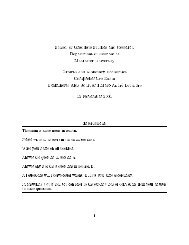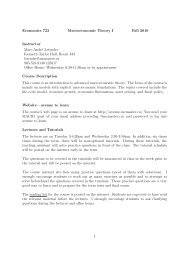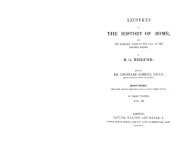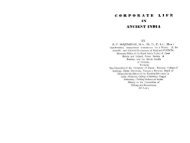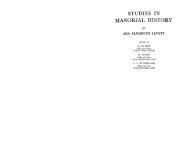competent h<strong>an</strong>ds which ruled it. Had he been allowed toattain to power in the ordinary way, he would probablyhave been the me<strong>an</strong>s of conferring great adv<strong>an</strong>tages onEngl<strong>an</strong>d. This seems proved by the beneficial results ofhis rule when, as during his first Protectorate, he had arecognized constitutional position. His second Protectoratewas too short to enable him to effect <strong>an</strong>ything. But onboth occasions he showed <strong>an</strong> <strong>an</strong>xious desire that hisauthority should be strictly defined <strong>an</strong>d precisely limited,which was in striking contrast with the way in whichGloucester on a similar occasion grasped at <strong>an</strong> extensionHis claim of his powers. For the final step taken by York in laying'O crown the in- claim to the crown there is absolutely no justification ondefensible. constitutional grounds, except in the eyes of those whohold a theory of royalty according to which there does notexist probably a single legitimate sovereign in the world.<strong>The</strong> right of the house of L<strong>an</strong>caster as resting on prescriptionwas far too strong to be set aside for a mere defect ofgenealogy1. Rut York was forced into this step, partlygecause he had learned by experience that from the r<strong>an</strong>courof Margaret he could be safe only on the throne,partly because she had so thoroughly identified the dynastywith the misgovernment of a party, that a ch<strong>an</strong>ge of<strong>The</strong> acces- government implied a ch<strong>an</strong>ge of dynasty also. And thoughlv the agreement made with York as to the, succession, <strong>an</strong>din form the subsequent accept<strong>an</strong>ce in Parliament of Edward IV,only alegitimist wore the guise of a legitimist restoration, that was ooly therestoration outward aspect of the ch<strong>an</strong>ge. <strong>The</strong> real grounds of it laymuch deeper. It was made possible. not by,the goodnessof the Yorkist pedigree, but by the hadnmof the L<strong>an</strong>castri<strong>an</strong>government. And the Speaker of the Houseof Commons, in his address to the crown on the latteroccasion, showed that the Commons were aware that' This prescriptive right was Blakm<strong>an</strong>, pp. 303, 305 (see themwell stated by the Lords in their cited, S. C. H. iii. 201). It is wellreply to York's claim ; Rot. Parl. stated also by Hallam, M. A. iii.v. 376 b. Better still, perhaps, by 195. Cf. Fortescue, De TituloHenry himself in the touching Edwardi, etc., cc. g, 10, 13.words preserved by his p<strong>an</strong>egyristthere were reasons for the ch<strong>an</strong>ge other th<strong>an</strong> genealogicall.Nor c<strong>an</strong> it be said that it was only by weakness that LsterL<strong>an</strong>thehouse of L<strong>an</strong>caster fell. From the death of Cardinal ~ ~ ~ ~Beaufort in 14-17 the rule of Henry VI, or rather of stitutional.Margaret <strong>an</strong>d her ministers, was not merely weak butflagr<strong>an</strong>tly unconstitutional. It violated in the most essentialpoints the compact by which the house of L<strong>an</strong>caster cameto the throne. By its steady mainten<strong>an</strong>ce of ministerswhom the nation distrusted <strong>an</strong>d abhorred, by its disregardto the wishes of the nation constitutionally expressed, byits attempts to tamper with the independence <strong>an</strong>d libertiesof Parliament2, that house destroyed its own best title tothe throne; <strong>an</strong>d its fate, however mel<strong>an</strong>choly, c<strong>an</strong>not becalled undeserved. Dr. Stubbs has said from his ownpoint of view that 'the acquittal of the house of L<strong>an</strong>casterdoes not imply the condemnation of the house of York3.'From the point of view here taken it would be equally trueto say, that the condemnation of the house of L<strong>an</strong>casterdoes not imply the acquittal of the house of York. Andyet the latter has been very unfortunate, in that it hasSome extractsfrom this speechare given in the notes to Chap.xix.<strong>The</strong> imprisonment of Youngin 1451 for proposing in Parliamentthat York should be declaredheir to the crown was a flagr<strong>an</strong>tattack on what Hallarn justly callsone of the ramparts of the Constitution,freedom of debate. <strong>The</strong>rewas nothing illegal or unconstitu-tional in Young's proposal. <strong>The</strong>causing Parliament to meet in outof-the-wayplaces, <strong>an</strong>d proroguingit frequently, till the members, outof very weariness, passed the courtmeasures, is distinctly complainedof by Gascoigne. At the Parliamentof Leicester in 1450, ' dictumfuit in public0 quod nisi cornmunitasAnglia articulis propositisconsentiret, parliamentum nonfiniretur, et plures minas et a regeet a suis juvenibus consiliariissustinuit communitas istius parliamenti;' p. 189. But the climaxwas reached at the Parliament ofCoventry In 1459, where theYorkists were attainted, when ' notime was given for the [Yorkist]earls to pack the House of Commons; the knights of the shirewere chosen on the nonzination of@c L<strong>an</strong>castri<strong>an</strong> leaders ;' S. C. H.111. 179. (<strong>The</strong> italics are mine.)<strong>The</strong> petition of the sheriffs for indemnitywas not merely, as Dr.Stubbs says, on account of thehaste with which the electionswere held, but because they hadbeen made in virtue of letters ofprivy seal instead of writs underthe great seal. <strong>The</strong> parliamentwas illegally summoned ab inifio,<strong>an</strong>d could not legalize itself; Rot.Parl. Chron. v. p. 367 83. ; cf. ib. 374 ; End.Const. Hist. iii. 286.
<strong>The</strong> House been judged in history for the most part not by Richardof Yorkunfo,tun- Duke of York, but by Richard Duke of Gloucester, <strong>an</strong>dhte in his- worse still by Edward Earl of arch. <strong>The</strong> defeats oftory.Wakefield <strong>an</strong>d St. Alb<strong>an</strong>'s did no lasting injury to theYorkist cause, but they caused iilcalculable harm to Eng-Compari- l<strong>an</strong>d. <strong>The</strong>y gave her as king, instead of a tried <strong>an</strong>d exsonofE ~ ~ perienced ~ ~ ~ statesm<strong>an</strong>, I v who, whatever his ambition, or evenwith his (if the reader should so determine) unscrupulousness, alwaysfather incharacter<strong>an</strong>d position.m<strong>an</strong>ifested ability <strong>an</strong>d circumspection, a showy <strong>an</strong>d selfindulgentyouth, whose undoubted abilities .were bal<strong>an</strong>cedby no corresponding sense of duty; but who might underhis father's training have developed into something muchbetter th<strong>an</strong> what he ultimately became. <strong>The</strong> personalcharacter of Richard Duke of York, his actual governmentin Fr<strong>an</strong>ce1, in Irel<strong>an</strong>d2, <strong>an</strong>d in Engl<strong>an</strong>d during his firstProtectorate, warr<strong>an</strong>t us in believing that he would haveruled very differently from Edward IV. But further, hewould have reigned under very different circumst<strong>an</strong>ces.Had the civil war been terminated by a conscientiousadherence to the agreement made in the Parliament of1460, there would not have been that weakening of the oldnobility" that weariness of <strong>an</strong>archy on the part of thepeople, which gave Edward IV <strong>an</strong>d the Tudors the oppor-Edward IV tunity they enjoyed of establishing a despotism. Edwardobliged to,i, the himself after his father's death had no choice but to gothrone. forward. Margaret's proceedings had made it plain thatonly as king could he be safe. He must either succeed inthat, or perish as his father had perished. It was absurd tol S. C. H. iii. 153 ; English inFr<strong>an</strong>ce, 11. xxix. ff.S. C. H. iii. 153. Accordingto Hall (p. 219), it was openly saidthat if he who ' had brought thatrude <strong>an</strong>d savage nation to ciuilefashion . . . once ruled in Eng-l<strong>an</strong>d, [he] wolde depose euilcounsaillers, correct euil judges,<strong>an</strong>d reforme all matters amisse,<strong>an</strong>d unamended.'S <strong>The</strong> Croyl<strong>an</strong>d Continuatorspeaks of the civil war as ' omniuinpene procerum regni luendamorticinis,' p. 529; <strong>an</strong>d modernhistori<strong>an</strong>s have repeated the state-ment. Mr. Oliph<strong>an</strong>t has howeverproved that the Tudor axe hadmore to do with the extinction ofthe old nobility th<strong>an</strong> Pl<strong>an</strong>tagenetdissensions ; Duke <strong>an</strong>d Scholar,pp. I 39 - 1f9. Fortescue himselfsays, per bella intestin<strong>an</strong>on paucis extinctis proceribus ;'Works, p. 63*.suppose that he could be bound by a compromise, whichhis opponents had been the first to break. And no onec<strong>an</strong> therefore blame him for seating himself on the throne.<strong>The</strong> reign of Edward IV is divided into two nearly Divisionsequal periods by his exile <strong>an</strong>d the brief restoration of his Ofhis"i~~deposed rival (Oct. 1470-April 1471). <strong>The</strong> former periodis marked by m<strong>an</strong>y of the characteristics of the latereign, whereas it is in the latter that we must chieflyseek for those indications of a newer state of thingswhich led a brilli<strong>an</strong>t modern writer1 to break throughthe old-fashioned divisions of English history, <strong>an</strong>d datethe beginning of personal monarchy from the accession ofEdward IV.At first Edward seems to have been sincerely <strong>an</strong>xious Desireofthat justice should be done I. But partly because the evils Edward to do jus- IVwere too deeply seated to yield at once to treatment, tice.partly because Edward either did not possess, or wouldnot exert himself to show, that administrative capacityfor which his father had been so distinguished, the old badstate of things in the main continued % <strong>The</strong>re are the Continu<strong>an</strong>ceol thesame local disorders, the same complaints of defective ad- old evils.ministration of justice, the same rivalries <strong>between</strong> thegreat lords, the same tendency to make use of personalinfluence to defeat the ends for which government oughtto exist. <strong>The</strong> number of the great lords was somewhatdiminished, but for the present their power was ratherincreased th<strong>an</strong> lessened by being concentrated in fewerh<strong>an</strong>ds. Warwick's possessions are said by a contemporaryto have been more th<strong>an</strong> double those of <strong>an</strong>y subject beforehis time4. <strong>The</strong> power of the Nevilles was in fact very Poweroppressive to Edward. <strong>The</strong>y were to him what the Percies :et,hyles.had been to Henry IV, what Buckingham afterwards wasto Richard 111. Up to the time of the declaration of' Mr. Green.See notes to Chap. xix. Cf.Waurin, ii. 299 : ' il y sema raisonet justice en lieu de rapine et desordonn<strong>an</strong>ce.'S M<strong>an</strong>y of the examples givenin the notes above (pp. 20-1,23? 25, 29-30, 32) are from therelgn of Edward IV. Cf. ThreeF~fteenth Cent. Chron. p. 181 :' Abundab<strong>an</strong>t tunc in An-lia furt.1,homicidia et mala multa.'Hearne's Fragment, pp. 299 f.Cf. notes to Chaps. ix. <strong>an</strong>d xv11.
- Page 1 and 2: OTHER WISE CALLEDThe Difference bet
- Page 3 and 4: THE work here presented to the read
- Page 5 and 6: preface. preface, xihistorical bear
- Page 7 and 8: NOTE.-AS a general rule the authori
- Page 9 and 10: xviii CLbconological Cable, QLbrono
- Page 11 and 12: INTRODUCTION.PART I.TIIE fifteenth
- Page 13 and 14: Key-note ' The key-note of the Lanc
- Page 15 and 16: 3(n troduction,His reign only as de
- Page 17 and 18: directed, and they must therefore b
- Page 19 and 20: crimes from punishment'. This evil,
- Page 21 and 22: Perversionof justice.Localoffice1 S
- Page 23 and 24: Influence use their local power to
- Page 25 and 26: houses of Parliament an oath agains
- Page 27: Tumber of action lay1. One cause of
- Page 31 and 32: does not involve the acquittal of t
- Page 33 and 34: life as ahnrrister.become possessed
- Page 35 and 36: ford Castle a prisoner named Thomas
- Page 37 and 38: Anarbitra- Wentworth and Sir John F
- Page 39 and 40: The Lancastriansretirenorthwards.Ag
- Page 41 and 42: which they said was ruining the cou
- Page 43 and 44: Illterview way alone. At Bdthune th
- Page 45 and 46: feelings the exiles received the ne
- Page 47 and 48: Requiredto write infavour ofthe Yor
- Page 49 and 50: Other come down to us for the most
- Page 51 and 52: And moche good truly gotyn hath bee
- Page 53 and 54: Date.The DeI.arrcfi6usLegurnA uglii
- Page 55 and 56: The RIS. is well and correctly writ
- Page 57 and 58: cording to Mr. Thompson, is of the
- Page 59 and 60: I'robably On the whole, the second
- Page 61 and 62: Aquinas, six I have failed to trace
- Page 63: Fortescue'scontemporaries.Littleton
- Page 66 and 67: sithpn thai had a kynge, wich was G
- Page 68 and 69: that cause and for gret necessite w
- Page 70 and 71: such meane. And yet of necessite th
- Page 72 and 73: and sqviers, and oper, in also gret
- Page 74 and 75: or by lande, pe kyng most encomptre
- Page 76 and 77: grettest lordes off Englond, rose a
- Page 78 and 79:
as hynl liste. And by discente per
- Page 80 and 81:
haue wherwith to bie hem bowes, arr
- Page 82 and 83:
Ther is no man hanged in Scotlande
- Page 84 and 85:
e kyng be counsellyd to restrayne g
- Page 86 and 87:
pe Romans, but also is hyghnes shal
- Page 88 and 89:
muned and del~bered with his fforsa
- Page 90 and 91:
CRITICAL NOTES.CHAPTER I.P. 109. 1.
- Page 92 and 93:
Bfbe bobernance of QEnfiian'tr,CHAP
- Page 94 and 95:
1. 24. parcial] parcialite L (from
- Page 96 and 97:
for granting taxes was the same as
- Page 98 and 99:
moral philosophy, but consists of a
- Page 100 and 101:
are brought about by the sin of man
- Page 102 and 103:
note$+ QLbap. ii,regendo: non autem
- Page 104 and 105:
note$+ CCbap, ii,up in the most une
- Page 106 and 107:
Later statutes fixed the limit of l
- Page 108 and 109:
&be bobernanre of QEngIanD*applied
- Page 110 and 111:
of the household of George Duke of
- Page 112 and 113:
RgidiusRumanus.. . . homines sibi s
- Page 114 and 115:
note see Janet, i. 35 1-373, 396,42
- Page 116 and 117:
'Ordinaryand extraordinaryexpenditu
- Page 118 and 119:
p----p---3723ESTIMATED EXPENDITURE.
- Page 120 and 121:
pestifera.' Very possibly Fortescue
- Page 122 and 123:
i the clerkys off theschekquer.] Be
- Page 124 and 125:
eciting how 'the seid Duc . . . lat
- Page 126 and 127:
was defined by Parliament in 4 Edwa
- Page 128 and 129:
punish ' piratas et spoliatores mer
- Page 130 and 131:
marchandyse is lost, . . . the see
- Page 132 and 133:
Transition pensiononmg, as it was d
- Page 135 and 136:
@Lbap+ bii,commiscomissioners in gr
- Page 137 and 138:
ap1-0,Bterc,cjzt4IjAnd on the other
- Page 139 and 140:
Charleshlartel.Fall of theCarolingi
- Page 141 and 142:
the Abbey of S. Albons' (July: Past
- Page 143 and 144:
York, married Constance and Isabell
- Page 145 and 146:
Taxon France, ii. 526, 533-4, 547,
- Page 147 and 148:
499 b). And no less than ~o,ooo mar
- Page 149 and 150:
which was probably in Fortescue's m
- Page 151 and 152:
holders of such grants are however
- Page 153 and 154:
286 Cbe Booernance of Qngianb.exter
- Page 155 and 156:
teristic of the Lancastrian times,
- Page 157 and 158:
such a contenuall counsell.] ' The
- Page 159 and 160:
character which the council might p
- Page 161 and 162:
which can not counsele hym' (Append
- Page 163 and 164:
306 &be bobernance of QEnglanD.'whe
- Page 165 and 166:
Sicque horum mediis concessit tande
- Page 167 and 168:
Ebe bobernance of QEngland.qualific
- Page 169 and 170:
Controlof the exchanges.Jealousyof
- Page 171 and 172:
during good behaviour. The Master o
- Page 173 and 174:
Cbe Qiobernance of QEngIand,says: '
- Page 175 and 176:
should be Justice, Chamberlain, Cha
- Page 177 and 178:
Offices per- system of executing of
- Page 179 and 180:
Defined by (e.g. Rot. Parl. v. 2 73
- Page 181 and 182:
have been detailed in the notes to
- Page 183 and 184:
of Sir Harris Nicolas there). This
- Page 185 and 186:
iiij. lordis temporelx, or in lasse
- Page 187 and 188:
y a pretensed title, saying he ys d
- Page 189 and 190:
'every broker, brogger, andhuckster
- Page 191 and 192:
suffre, suffer, 152. 14 ; soeffre,
- Page 193 and 194:
Cade, rising of, pp. 11, 284; hisco
- Page 195 and 196:
~ .-.~--hopes entertained of him, p
- Page 197 and 198:
Franchise, question of, in medizval
- Page 199 and 200:
Loans raised by the government,pp.
- Page 201:
Pisa, Council of, p. 243. .Pitt, se



